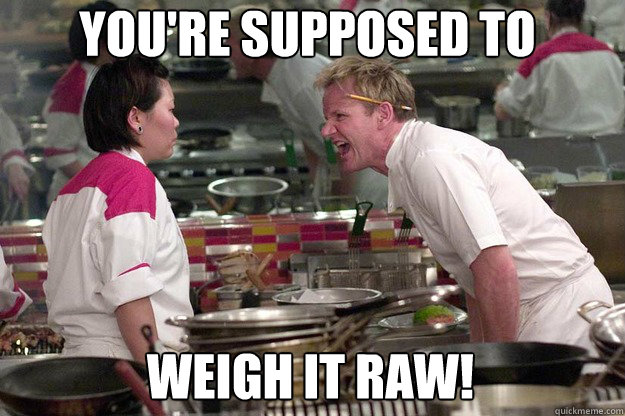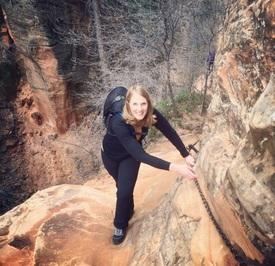HELP!!! Do you weigh your meat cooked or uncooked?
Replies
-
If you weigh raw, search the database for raw.
If you weigh cooked, search the database for cooked.
Chicken breast, for example, has database entries for raw as well as roasted.
I personally weigh raw. Meat, in its raw state, is fairly consistent in terms of nutritional data. However, how one cooks meat can alter its weight significantly because of moisture loss (which is not the same as calorie loss).
For instance, 120g of raw chicken breast is about 132 calories. If I cook that chicken beautifully, so it's moist and awesome and delicious, it will weigh around 80 grams - also 132 calories. Now let's say I forget the chicken while it's cooking, and the result is dry and tasteless but still edible. Because I've cooked out every bit of moisture, it now weighs only 65 grams. If I log the cooked weight, I'm only logging 107 calories.
Despite the fact that I started off with 120 grams of raw chicken, 132 calories worth, if I weigh it (over)cooked, I'm going to be logging 107.
Maybe it's not a big deal to you, but with a more calorie dense piece of meat it might matter. It's quite easy for me to weigh it raw most of the time, so I do. In the event that I weigh it cooked, I always select the *cooked* version of chicken from the database.0 -
This content has been removed.
-
 0
0 -
COOKED0
-
The weight on the package is it's raw weight. I weigh mines cooked and search for (cooked) meats in the databases0
-
Broke college boy doesn't buy gadgets for the sake of dieting. The meat counter weighs my meat raw so raw is how it's weighed.0
-
I am so confused! Am i supposed to weigh my chicken when its raw or cooked? If i weigh it when its raw 100g is not very much at all & if i weigh it cooked arnt I eating more than 100g because it would've been more than that before it was cooked?
Also how the heck are you supposed to know which nutritional information to trust? I've looked at the different listing for 100g cooked chicken breast on here & heaps of other websites and they all list different cals between 100 to 291 - for the same thing???
I always weigh before cooking and go by that. Packaging should contain nutritional info including the calories in that food, if it doesn't, I usually go by calories counts on MFP - generic.0 -
I recently just read in an article, I believe Women's Health, advised readers to weigh after it was cooked.0
-
I recently just read in an article, I believe Women's Health, advised readers to weigh after it was cooked.0
-
Weigh raw. A sheet of butcher paper or plastic wrap helps keep your kitchen scale clean.0
-
Raw - I'm not sure how you would even weigh things cooked unless you are just grilling/baking pieces of meat? I put chicken IN dishes, cook it with a bunch of other stuff, no way to weigh it by itself cooked.
But i have another Q, lets assume it is raw weight for chicken/meat - is that for frozen or thawed?0 -
Raw - I'm not sure how you would even weigh things cooked unless you are just grilling/baking pieces of meat? I put chicken IN dishes, cook it with a bunch of other stuff, no way to weigh it by itself cooked.
But i have another Q, lets assume it is raw weight for chicken/meat - is that for frozen or thawed?
Good question, I usually weigh thawed, no idea what is the correct way though to be honest.0 -
Hi, I had the same question!!
My diet plan for the week had 80g of chicken breast raw weight on the menu for lunch today.
I didn't read it properly yesterday and thought i would be prepared and cook it in advance.
I just put chicken breast raw weight and chicken grilled weight into a calorie counter app.
Here are the results:
80g raw weight = 84 calories
80g grilled weight (no fat added) = 134 calories
However, i found that 50g of chicken breast grilled was 83 calories. So i'll be going with this for lunch today 0
0 -
Typically, meat is weighed uncooked. Cooking is variable. The base amount is not. If you cooked two steaks of the same size, one rare and one well, the rare one is going to weigh more than the well done one. How much your meat weighs after cooking partially depends on how much you cook it. That's why meat is weighed before it's cooked.0
-
Just to throw a wrench into this whole topic this article written by the chair of biological anthropology at Harvard University basically says that cooking meat adds calories because it is more digestible.
http://blogs.discovermagazine.com/crux/2011/12/08/why-calorie-counts-are-wrong-cooked-food-provides-a-lot-more-energy/#.UfkdkNKsiSo0 -
interesting topic...

personally, I weight uncooked - if I have to split a meal e.g. spag bol, I use the recipe function and err on the side of caution
On the idea of cooking adding calories... I'm a biochemist... ive read various articles (including the one posted by ddoeren84). I suspect that this is a red herring... Calorific values are calculated using a bomb calorimeter - basically the test item is burned completely and the output energy measured. This is the maximum energy (calories) the item contains and may be done on food (per gram) in any state - cooked, raw etc. as specified for the test. Energy being more accessible in cooked food will not affect the maximum value the food contains. Rather, raw food energy is less accessible i.e. you are not getting the maxium energy out of the food. Living systems are not bomb calorimeters - not as consistent or efficient
Also as established, food loses water (weight) upon heating (cooking), therefore you get more energy per gram in cooked food, especially meat - unless it absorbs water (like rice) in which case you get less energy per gram. As long as you have the state in your search/results you should be fine - but I think raw is more accurate and probably reflects the max. energy (calories) you will get out of it.
Good luck everyone regardless and keep up the good work! 0
0 -
If It's raw I weigh raw. Same with all ingredients in food I cook from scratch.
The only time I use cooked weights is if the ingredient is pre-cooked.0 -
I work for a restaurant company and we do our nutritionals AFTER the food product/meal is in its final stage, as in completely cooked, assembled and ready to serve. As far as how much it weighs before it cooks, that is what we tell the customer they are paying for, what size they actually get, is different0
-
I always weigh uncooked. I figured it was the same as in restaurants. Order a 10oz steak and you don't get 10 ounces of cooked meat.0
-
For the most part, I weigh before I cook. Sometimes, I forget though, in which I then weigh after I cook and subtract .5 ounces. Example: If my goal is to eat 8 oz of chicken but I forget to weigh before cooking, I only eat 7.5 ounces of the cooked meat.0
-
Come on, are you serious ?!
You calculate how much you are actually ingesting.
If the chicken breast was 300g raw, and u eat it raw, u calculate 300g
(Hopefully you wouldn't eat raw chicken, that's just mad!)
You always record and calculate what you are actually consuming, so weigh everything once cooked.1 -
What? If it's 300g raw, but 200 g cooked, it will still have the same number of calories as the 300g raw, because the only thing it lost was WATER, which has zero calories. If you weigh it after cooking, you will be underestimating calories consumed. This is a big reason why people fail at losing weight while calorie counting, as this can account for hundreds of calories a day. My example is a difference of almost 200 calories alone.Come on, are you serious ?!
You calculate how much you are actually ingesting.
If the chicken breast was 300g raw, and u eat it raw, u calculate 300g
(Hopefully you wouldn't eat raw chicken, that's just mad!)
You always record and calculate what you are actually consuming, so weigh everything once cooked.0 -
Just to throw a wrench into this whole topic this article written by the chair of biological anthropology at Harvard University basically says that cooking meat adds calories because it is more digestible.
http://blogs.discovermagazine.com/crux/2011/12/08/why-calorie-counts-are-wrong-cooked-food-provides-a-lot-more-energy/#.UfkdkNKsiSo
This link doesn't seem make sense. As far as I know, the Atwater system is based on total calories in food, not the amount available to us during digestion. Therefore calorie counts should actually overestimate for both cooked and raw foods. Obviously it will overestimate far more for raw and minimally processed foods though.0 -
Weigh everything cooked per my nutritionist and when I did weight watchers, the instructor said the same thing. For instance, a serving of pasta (any kind) or rice is by weight. Both weigh more after cooking. Meat usually shrinks during cooking, so you are getting less if you use a precooked weight, this is not good if you need specific amounts of protein. So yeah, weigh everything after cooking.0
-
I agree with Tigersword.
It makes sense to weigh the food raw whenever possible. All you lose is water, and maybe a bit of fat, but that means you haven't underestimated.
Everyone cooks meat to a different doneness, ie. there are different amounts of water left. Could be more done even if it is chicken or pork, nevermind beef (rare, med. rare, med. well etc.) I guarantee you that my 200g of cooked chicken has different values than yours as I like mine very juicy, almost underdone. My wife likes hers like leather so the same raw piece with the same food value weighs a lot different after being cooked.
The only way to be accurate is to weigh raw and use the raw food value from the USDA.0 -
Weigh everything cooked per my nutritionist and when I did weight watchers, the instructor said the same thing. For instance, a serving of pasta (any kind) or rice is by weight. Both weigh more after cooking. Meat usually shrinks during cooking, so you are getting less if you use a precooked weight, this is not good if you need specific amounts of protein. So yeah, weigh everything after cooking.
If you read the previous posts in this thread, you would know that most of the weight meat loses during cooking is WATER WEIGHT. So you're not getting less food. In fact, because cooked meat is more readily digested than raw meat you're actually getting MORE calories. So weigh the food raw for the best estimate (and make no mistake, it's just a rough estimate).0 -
I checked the nutrition facts of protein, raw vs cooked. Protein was cut down from 25g to 15g.0
-
I have always weighed mine cooked and obviously not a biggie as I have lost 42 lbs..so there ya go.0
-
Im confused about weighing rice, If I cook a cup of raw rice it turns into a lot more than a cup of cooked, so when I weigh it out to eat I measure out a cup cooked. I cant imagine eating all the rice that came from 1 cup of raw rice.0
-
Im confused about weighing rice, If I cook a cup of raw rice it turns into a lot more than a cup of cooked, so when I weigh it out to eat I measure out a cup cooked. I cant imagine eating all the rice that came from 1 cup of raw rice.
Make less than 1 cup of dry rice?
Or portion up the cooked amount of 1 cup of dry rice. Regardless of how much it makes, if you divide it in 4, that would be the same as 1/4 cup dry rice.0
This discussion has been closed.
Categories
- All Categories
- 1.4M Health, Wellness and Goals
- 398.3K Introduce Yourself
- 44.7K Getting Started
- 261K Health and Weight Loss
- 176.4K Food and Nutrition
- 47.7K Recipes
- 233K Fitness and Exercise
- 462 Sleep, Mindfulness and Overall Wellness
- 6.5K Goal: Maintaining Weight
- 8.7K Goal: Gaining Weight and Body Building
- 153.5K Motivation and Support
- 8.4K Challenges
- 1.4K Debate Club
- 96.5K Chit-Chat
- 2.6K Fun and Games
- 4.7K MyFitnessPal Information
- 17 News and Announcements
- 21 MyFitnessPal Academy
- 1.5K Feature Suggestions and Ideas
- 3.2K MyFitnessPal Tech Support Questions






















